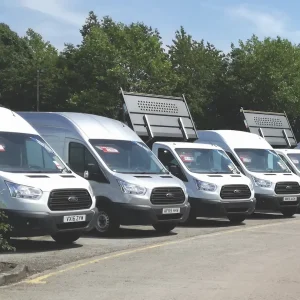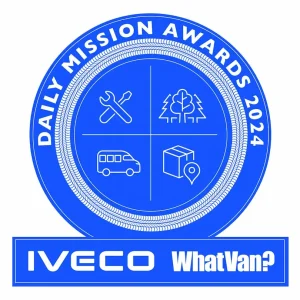Rising inflation, unstable supply chains and the war in Ukraine all contributed to a challenging year for Volkswagen Nutzfahrzeuge (Volkswagen Commercial Vehicles) according to CEO and chairman of the board of management, Carsten Intra. Despite these pressures, however, the German van manufacturer still managed to achieve earnings of more than half a billion euros for the second year in a row.
At the end of the 2022 financial year VW recorded an operating profit of €529m (£464m), even though vehicle deliveries dropped slightly. Sales increased to €11.5bn compared to €9.9bn in the previous year thanks to the success of the ID Buzz and ID Buzz Cargo. Although Intra says that sales of pure BEVs are still at a low level, he believes this should rise quickly.
Global vehicle deliveries by VWCV fell from 359,500 to 328,600 units but crucially their market share improved in some of the most important regions. Its performance in Europe saw a 1.5% increase to almost 13% and according to its own statements, VWCV achieved an improved market share of more than 23% in its home market of Germany.
Although 2022 was the year VW re-entered the pick-up truck segment with the new Ford-manufactured Amarok, it was very much a year for EVs, with a total of 7,500 all-electric vehicles delivered to customers – more than twice the number of electric vehicles registered in the previous year. Volkswagen’s electric commercial vehicles are, however, still only making up a fraction of total market sales in Europe at just 2.3% of the overall segment.
Yet, the demand for Volkswagen vans also led to record levels for their order book with nearly 300,000 vehicles on order. The Hanover plant, previously used to produce Amarok pick-ups but now producing the ID Buzz should reach full capacity during this year, producing 900 vehicles a day to help clear the backlog.
VWCV’s return on sales also grew to 4.6% and is forecast to exceed 5% this year, yet cashflow levels have been highlighted as an area for improvement with reserves of just €259m largely due to bottlenecks in transport and deliveries. The target is to increase that number to €500m. Perhaps most notable of all the achievements though, is the reversal of fortunes from the beginning of the pandemic to today.
“If we take the two years 2021 and 2022 together, our combined profit turnaround amounts to around €1bn,” said Michael Obrowski, board member for finance.
In their annual market briefing, Obrowski said these figures were a solid foundation for profitable growth and are thanks to an increasing trend towards customers choosing higher-end models that have a better profit margin. There was also repeated mention of the company’s pursuit of autonomous driving which is expected to spur further sales and revenues.
In 2023, VWCV will conduct extensive driving tests in Munich of autonomous mobility vehicles with a view to launching autonomous vehicles in series production by 2025.
“We will be presenting the production version of our ID Buzz AD [Autonomous Driving] vehicles to you in 2025. Initially, they will be used at [ride sharing service] MOIA in Hamburg. Other cities in Germany and the USA will follow. Sustainability is not just an agenda item in our programme; it is actually the foundation for everything that we do,” Intra said.
Volkswagen Commercial Vehicles is the leading brand for autonomous driving in the Volkswagen Group and is therefore also responsible for the development of the MaaS (Mobility as a Service) and TaaS (Transport as a Service) business areas.
“We want to actively do our part to contribute towards handing over an intact foundation to future generations for living and working. This is our vision and our responsibility,” Intra added.
Their so called ‘ESG strategy’ forms part of Intra’s priority objectives for 2023 that all contribute to the Grip 2030 corporate strategy, a group objective to sell more than 55% green EVs and which includes the further electrification of VWCV’s vehicle fleet.
Amongst Intra’s targets are ambitious operating results, customer centricity and premium status, BEV transformation as well as sustainability and decarbonisation.
Product evolution and the partnership with Ford will also play a significant role going forward. The ID Buzz will be launched later this year as a long wheelbase passenger variant, but a larger commercial vehicle won’t be forthcoming and demand will instead be met with other models.
After the success of the plug-in hybrid Multivan, VWCV will continue to expand its range of powertrains alongside future BEV models with the Caddy being offered as a PHEV. VW says it sees a need for private and commercial customers who cover a lot of long distances but want emission-free city driving. As a result, in the future, the electric ranges of the plug-in hybrids will be up to 100km (62 miles). However, interest in a CNG-powered Caddy appears to have slipped from the agenda.
On the topic of e-fuels – a much debated subject at the time of the annual briefing – due to Germany and several other countries’ dissent to the outright ban of combustion fuels – Volkswagen Commercial Vehicles is not planning on developing any specific solutions, saying “the development of ICE engines is focusing on the most demanding emission standard, EU7. The developments in different regions are closely monitored. It is our clear objective to offer our customers in each country the respective best marketable emission standard”.
Other markets in the east will be targeted, where in addition to Japan, the ID Buzz is also to be launched in Singapore as well as Turkey and Israel. In total Volkswagen CV products are expected to appear in a further 15 countries.
With new markets, models and powertrains on the horizon, one thing for certain is that the e-Crafter successor is not coming anytime soon. Any replacement won’t be due until 2027, when it will likely be based on Ford’s E-Transit as the relationship with its new alliance partner develops.
The next chapter of their joint co-operation will be for the replacement of the Transporter T6.1 which will see order books for the Volkswagen-made van close from mid-2024 due to the enormous demand and the resulting high order backlog. New versions, however, have been confirmed to have diesel, plug-in hybrid and pure electric drivetrains.
The ID Buzz is bringing enviable levels of success to Volkswagen Commercial Vehicles and much of the future outlook for the firm rests on the development of the model and its connected systems. The strategy of how VWCV grows into new and emerging transport sectors is being laid out here and now, and with revenues and increasing returns the path to their 2030 objectives looks promising.
Where does Caddy go from here?
The Volkswagen Commercial Vehicles annual briefing covered a wide range of topics but the relationship with Ford was highlighted as a key priority for the year and that could be with good reason.
Ford has just revealed its new Transit Courier and, although there’s no word on whether Volkswagen will be adopting it for itself, the small van does play a significant role in Ford’s new range, as the cheapest model it can offer. While that’s always been the case for the commercial vehicle line-up, the Courier, as a Tourneo Courier people mover, will also be the most affordable Ford car, replacing the Fiesta, which has been discontinued. Although Volkswagen still has the Up! and Polo as its entry-level cars, the Transit Courier – which will arrive later this year as petrol and diesel vans and get electrified in 2024 – overlaps considerably in size with the Volkswagen Caddy and VW-made Ford Transit Connect.
As VW ramps up its ID range of cars, building more products on the MEB platform, models like the Caddy (although built on a shared MQB platform) look increasingly at risk of getting the chop. Would a Courier-sized Volkswagen fit the future plans if Caddy and Transit Connect production were taken off their hands?
In doing so, VW would cede production of all its commercial vehicles to Ford which could perhaps be a step too far for such a proud manufacturer, but if its priorities lie elsewhere (namely in electrification and autonomous driving) it’s not beyond the realms of possibility.
George Barrow is the UK jury member for the International Van of the Year Award. Additional reporting by Liam Campbell.





